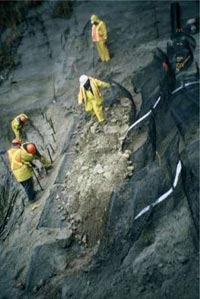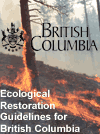 |
|

Safety
Safety is a primary concern during on-site
work, and will be an important part of your restoration planning.
You should identify and mitigate any potential hazards in advance,
and plan for the proper safety gear, equipment, and procedures.
You'll also need to consider whether your plans will pose a hazard
to the public, either during the work or after the work is complete.
An example of a public hazard is girdled trees near a walking trail.
These trees will eventually snap and pose a hazard as they fall.
|
Potential Safety Hazards
|

|
Heavy machinery
|

|
Power tools and hand tools
|

|
Remoteness
|

|
Lack of safety plans & equipment
|

|
Un-heeded safety procedures
|

|
Communications and vehicle breakdowns
|

|
Poison ivy, nettles
|

|
Wild animals and snakes
|

|
Ticks, wasps and bees
|

|
Steep slopes
|

|
"Snags"
|

|
Swift water
|

|
Foul weather
|
|

Dave Polster
|
Note the hard hats and high visibility
clothing, necessary for safety reasons.
|
|
You will need to be familiar with Workers' Compensation
Board procedures to avoid accidents and to ensure coverage if someone
gets injured. If one of your WCB hazards are 'snags', (wildlife
trees) you should minimize their removal; Wildlife Tree
Assessors are available to assess their risk, and no-work zones
can be created to ensure that these important habitat elements are
not lost due to safety concerns.
|
Safety Equipment and Procedures
|

|
Hold tailgate safety meetings regularly stressing proper lifting,
tool use safety, and reporting accidents and injuries.
|

|
Follow Workers Compensation Board
regulations but avoid loss of important ecological elements
such as wildlife trees
(“snags”). |

|
Maintain appropriate first aid kits and supplies.
|

|
Plan for communications (the ability to call an ambulance or
helicopter if needed).
|

|
Plan for emergency medical evacuation.
|

|
All workers should have personal safety gear; the type will
depend on the project. Safety gear includes:
|

|
hard hat
|

|
gloves
|

|
appropriate boots (may be hard toed)
|

|
safety glasses
|

|
high visibility vest
|

|
proper foul weather gear
|
|
|








